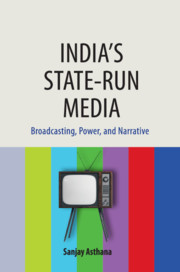24 results
Latent Factor Structure and Measurement Invariance of the NIH Toolbox Cognition Battery in an Alzheimer’s Disease Research Sample
-
- Journal:
- Journal of the International Neuropsychological Society / Volume 27 / Issue 5 / May 2021
- Published online by Cambridge University Press:
- 05 October 2020, pp. 412-425
-
- Article
- Export citation
Dedication
-
- Book:
- India's State-run Media
- Published online:
- 08 May 2019
- Print publication:
- 09 May 2019, pp v-vi
-
- Chapter
- Export citation
1 - Broadcasting, Spatiotemporalities, and Power
-
- Book:
- India's State-run Media
- Published online:
- 08 May 2019
- Print publication:
- 09 May 2019, pp 24-62
-
- Chapter
- Export citation
List of Figures and Tables
-
- Book:
- India's State-run Media
- Published online:
- 08 May 2019
- Print publication:
- 09 May 2019, pp ix-x
-
- Chapter
- Export citation
Epilogue
-
- Book:
- India's State-run Media
- Published online:
- 08 May 2019
- Print publication:
- 09 May 2019, pp 159-176
-
- Chapter
- Export citation
Acknowledgements
-
- Book:
- India's State-run Media
- Published online:
- 08 May 2019
- Print publication:
- 09 May 2019, pp xi-xiv
-
- Chapter
- Export citation
Frontmatter
-
- Book:
- India's State-run Media
- Published online:
- 08 May 2019
- Print publication:
- 09 May 2019, pp i-iv
-
- Chapter
- Export citation
Introduction
-
- Book:
- India's State-run Media
- Published online:
- 08 May 2019
- Print publication:
- 09 May 2019, pp 1-23
-
- Chapter
- Export citation
Index
-
- Book:
- India's State-run Media
- Published online:
- 08 May 2019
- Print publication:
- 09 May 2019, pp 205-210
-
- Chapter
- Export citation
5 - Remembering Doordarshan: Figurations of Memories and Nostalgia on Blogs, YouTube, and in Oral Interviews
-
- Book:
- India's State-run Media
- Published online:
- 08 May 2019
- Print publication:
- 09 May 2019, pp 127-158
-
- Chapter
- Export citation
4 - Patriotism and Its Avatars: Tracking the National–Global Dialectic in Music Videos and Television Commercials
-
- Book:
- India's State-run Media
- Published online:
- 08 May 2019
- Print publication:
- 09 May 2019, pp 107-126
-
- Chapter
- Export citation
Contents
-
- Book:
- India's State-run Media
- Published online:
- 08 May 2019
- Print publication:
- 09 May 2019, pp vii-viii
-
- Chapter
- Export citation
3 - Televisual Representations of Socio-Spatial Conflicts, and the Religious–Secular Imaginaries
-
- Book:
- India's State-run Media
- Published online:
- 08 May 2019
- Print publication:
- 09 May 2019, pp 83-106
-
- Chapter
- Export citation
Bibliography
-
- Book:
- India's State-run Media
- Published online:
- 08 May 2019
- Print publication:
- 09 May 2019, pp 177-204
-
- Chapter
- Export citation
2 - Doordarshan, Literary Drama, and Narrative Identity
-
- Book:
- India's State-run Media
- Published online:
- 08 May 2019
- Print publication:
- 09 May 2019, pp 63-82
-
- Chapter
- Export citation

India's State-run Media
- Broadcasting, Power, and Narrative
-
- Published online:
- 08 May 2019
- Print publication:
- 09 May 2019
Longitudinal Assessment of Self- and Informant-Subjective Cognitive Complaints in a Sample of Healthy Late-Middle Aged Adults Enriched with a Family History of Alzheimer’s Disease
-
- Journal:
- Journal of the International Neuropsychological Society / Volume 23 / Issue 8 / September 2017
- Published online by Cambridge University Press:
- 11 July 2017, pp. 617-626
-
- Article
- Export citation
Cardiorespiratory Fitness Attenuates the Influence of Amyloid on Cognition
-
- Journal:
- Journal of the International Neuropsychological Society / Volume 21 / Issue 10 / November 2015
- Published online by Cambridge University Press:
- 19 November 2015, pp. 841-850
-
- Article
- Export citation
Amyloid Burden, Neuronal Function, and Cognitive Decline in Middle-Aged Adults at Risk for Alzheimer's Disease
-
- Journal:
- Journal of the International Neuropsychological Society / Volume 20 / Issue 4 / April 2014
- Published online by Cambridge University Press:
- 11 March 2014, pp. 422-433
-
- Article
- Export citation
Chapter 8 - The use of transdermal 17β-estradiol in the treatment of Alzheimer's disease
- from Section 2 - Varieties of estrogenic therapy
-
-
- Book:
- Hormones, Cognition and Dementia
- Published online:
- 06 July 2010
- Print publication:
- 24 September 2009, pp 80-86
-
- Chapter
- Export citation



